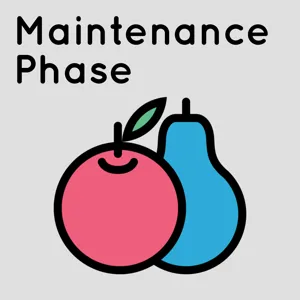Podcast Summary
Exploring the Similarities Between Conspiracy Theories and Wellness Scams with Mike Rothschild: Don't fall for the "cure-all" solutions touted by the wellness industry. Always research before trying any new trend or product, and be cautious of false promises. Just like with conspiracy theories, the health industry can be full of misinformation and scams.
The Maintenance Phase podcast hosts Michael Hobbes and Aubrey Gordon welcome guest Mike Rothschild, a journalist who covers QAnon conspiracy theories and has previously covered wellness scams.Rothschild discusses his experiences on both beats and highlights the similarities between the two, such as the false promises of a cure-all solution.One example Rothschild gives is the trend of oil pulling, where swishing oil in your mouth is supposed to rid your body of toxins and cure a slew of unrelated illnesses.Be cautious of products and methods that claim to cure everything and do your research before trying any new wellness trend.
The Connection Between the Wellness Industry and QAnon Conspiracy Theories: The wellness industry can lead people towards QAnon conspiracy theories, which revolve around a supposed deep state and a future great awakening. It is important to stay informed about these false claims and misinformation spread by conspiracy theories to prevent their dangerous impacts.
The wellness industry can be an unexpected entry point for people to fall into QAnon conspiracy theories.QAnon is a conspiracy theory that revolves around a supposed deep state and a future great awakening.While polling for QAnon supporters may be low, many people who support the key ideas of QAnon do not know anything or are actively against the theory.This can make it difficult to track and stop the spread of these dangerous ideas.It is essential to be aware of the dangerous pathways that can lead people towards extremist beliefs and to stay informed about the false claims and misinformation spread by conspiracy theories.
The Cult-Like Aspects and Dangerous Extremes of the QAnon Belief System: QAnon is a complex belief system that draws people in by catering to their distrust of authority and the medical establishment. While there may be real issues with corporate exploitation and lack of transparency, QAnon takes these ideas to a dangerous extreme with unfounded beliefs in secret cabals and child trafficking rings. Beware of wellness conspiracy theories and anti-vax movements that may lead to involvement in QAnon.
QAnon is a complex belief system with multiple aspects, catering to different people in different ways.It has cult-like qualities, with a distrust of outside authority and a focus on secret knowledge.One aspect that draws people in is the belief that they are being lied to by experts, the media, Big Pharma, and politicians.This distrust of authority and the medical establishment can lead to a belief in wellness conspiracy theories and anti-vax movements.While there may be some real issues with corporate exploitation and lack of transparency, QAnon takes this idea to a dangerous extreme, with an unfounded belief in secret cabals and child trafficking rings.It is difficult to estimate how many people enter QAnon through the wellness pipeline.
The dangerous spread of conspiracy theories and anti-vaccine sentiments on social media.: Social media algorithms may lead to rapid and efficient radicalization processes, as users are recommended other groups based on their interests. Additionally, popular wellness influencers and mommy bloggers with large followings are also contributing to the spread of dangerous conspiracy theories, leading some followers down dangerous paths.
During the pandemic, conspiracy theories and anti-vaccine sentiments grew rapidly on social media, particularly on Facebook.Members who join one group may be recommended other groups based on Facebook's algorithms, leading to a rapid and efficient radicalization process.While some groups have hundreds of thousands of members, the creators of these conspiracy theories attempt to distance themselves from the more extreme aspects of their beliefs, such as anti-Semitism or racism, to avoid turning off more mainstream members.Wellness influencers and mommy bloggers with hundreds of thousands of followers have also joined in, bringing their followers along with them down dangerous rabbit holes.
The Role of Social Media in the Spread of Misinformation and Conspiracy Theories: Social media platforms foster a culture of sharing unsourced claims and misinformation through private groups and influencers. It is important to be cautious of the sources of information we share and believe to avoid the further spread of conspiracy beliefs.
Social media platforms, like Facebook, Instagram, and YouTube, are central to the spread of conspiracy theories and misinformation because of their visual, aspirational culture that allows people to share unsourced, easily shareable claims.Private Facebook groups and Instagram influencers provide a sense of community and a space for inquiry, making it easy for people to forget that their beliefs are reinforced by like-minded people.Additionally, the appeal to free speech and parental choice is often used as a cover for anti-vaxx and conspiracy beliefs.It is important to be careful about the sources of information we share and believe to prevent further spread of misinformation.
Understanding QAnon's Beliefs and Ideology: QAnon followers believe in conspiracy theories and feel that they are being censored by big companies and a deep state that is trying to destroy them. Their mistrust of mainstream media and institutions fuels a sense of persecution and grievance. However, QAnon's ideology can be dangerous as it feeds into the right-wing culture war and promotes an us-versus-them mentality.
QAnon promotes the idea that big companies want to destroy its followers because they are a threat to the deep state.The movement claims that the election was stolen and President Biden is a puppet candidate.Many Q believers are against Big Pharma and proponents of holistic medicine.The movement is nonviolent, but its followers are willing to believe in conspiracy theories to assert that they are being censored.Many Q followers don't realize that they are part of the movement.QAnon's ideology feeds into the persecution and grievances that are associated with the right-wing culture war.Its followers believe that they are fighting against an entity that will kill anybody who gets in their way.
The Correlation Between Wellness Conspiracies and QAnon: Believing in wellness conspiracies can make people more susceptible to extreme forms of conspiracy thinking like QAnon. While we should show compassion towards those who believe in these theories, it's essential to understand that they act as a gateway drug for more dangerous and baseless beliefs.
Wellness conspiracies can act as a gateway drug to QAnon and other forms of conspiracy thinking.People who fall into QAnon often already believed in something else that was unevidenced, such as wellness conspiracies, 9/11 trutherism, or Trump Spygate trutherism.QAnon promises hope and a sense of control, with the belief that bad people will be gotten rid of and the war between the white hats and the Babylonian cult will be won.While it's important to show grace to those who believe in wellness conspiracies, it's also important to recognize that these beliefs can increase susceptibility to more extreme forms of conspiracy thinking.
The Difficult Process of Pulling Someone Out of QAnon: Leaving QAnon requires an internal desire to stop believing in the conspiracy theory, and it can be challenging to convince followers to do so due to their ability to justify and reconcile mistakes and failed predictions. While some have successfully left QAnon by recognizing defects in its belief system, the journey is often isolating and difficult, with various triggers leading to a reappraisal of one's beliefs.
Getting someone out of QAnon is a difficult process because they must want to stop believing it.People who have left QAnon have seen a defect in the belief system and pulled on the thread to unravel it.QAnon followers find ways to justify and reconcile mistakes and failed predictions, making it hard to convince them otherwise.There are people who have left QAnon, but there are very few willing to talk about it because they feel embarrassed and ashamed.The threads that people pull on to leave QAnon vary, from a misquote of a Bible verse to a misreading of public records.
Communicating with QAnon Believers: Dos and Don'ts: If you want to help someone who believes in QAnon, avoid debating or fact-checking their beliefs. Instead, focus on shared experiences and interests. De-radicalizing someone is a personal and difficult process that may not always succeed. Prevention through regulating the platform to limit the spread of misinformation is the only scalable solution to preventing widespread belief in conspiracy theories like QAnon.
To help someone who believes in QAnon, it's important to maintain communication with them and avoid talking about QAnon.Instead, talk about shared experiences and interests.Don't try to debate or fact-check their beliefs, as this can make them feel persecuted and drive them further into the belief.It's a personal and labor-intensive process to deradicalize someone from a conspiracy theory, and it's not guaranteed to succeed.Prevention, such as regulating platforms to limit the spread of misinformation, may be the only scalable solution to preventing the widespread belief in conspiracy theories like QAnon.
The Danger of QAnon: A Violent and Antisemitic Conspiracy Theory: Believing in QAnon can have serious consequences, including violence, isolation, and loss of relationships and employment. It is important to understand the dangerous implications of this conspiracy theory and work towards a more inclusive society.
QAnon is a dangerous conspiracy theory that has led to violence, including murders, vandalism, and kidnappings.Unlike other conspiracy theories, QAnon is inherently violent and promotes the idea of taking action against the supposed shadowy group of people controlling the world.It draws on previous conspiracy theories and has roots in anti-Semitic beliefs.While individuals are entitled to their beliefs, QAnon has caused significant harm and isolation for those who believe in it, losing their jobs, families, and friends.It's important to recognize the danger of QAnon and to work towards a more compassionate and inclusive society.
The Importance of Fact-Checking and Mental Health in the Age of Conspiracy Theories: Stay vigilant and educate yourself and your loved ones about conspiracy theories. Don't fall into the trap of "us versus them" thinking and be aware of the impact that QAnon and similar movements can have on mental health. Take a proactive approach to mental health by seeking accurate information and intervening early if someone you know starts exhibiting signs of falling into conspiracy theories.
In a podcast about QAnon's impact on mental health and wellness spaces, the hosts discussed the importance of fact-checking and being aware of conspiracy theories that can lead to a "nihilistic abyss." They also emphasized the need to monitor loved ones for signs of falling into conspiracy theories and intervening early.The hosts cautioned against framing every issue as "us versus them" and emphasized that many institutional blind spots are not deliberate conspiracies, but rather cluelessness and lack of education.Taking a proactive approach to mental health and seeking accurate information can help prevent falling into the trap of conspiracy theories.
Understanding and navigating conspiracy theories and misinformation: To effectively combat conspiracy theories and misinformation, it's important to understand why people believe in them and to separate personal catharsis from actual strategies for helping others. It's also important to protect our own boundaries and peace of mind while navigating these situations, as developing these skills can benefit everyone.
In combating conspiracy theories and misinformation, it's important to understand why people believe in them and what they provide for them.It's also necessary to separate personal catharsis from actual strategies to reach and help others.However, it's not just about helping others, but also protecting our own boundaries and peace of mind.Overall, getting better at navigating these situations can benefit everyone.






